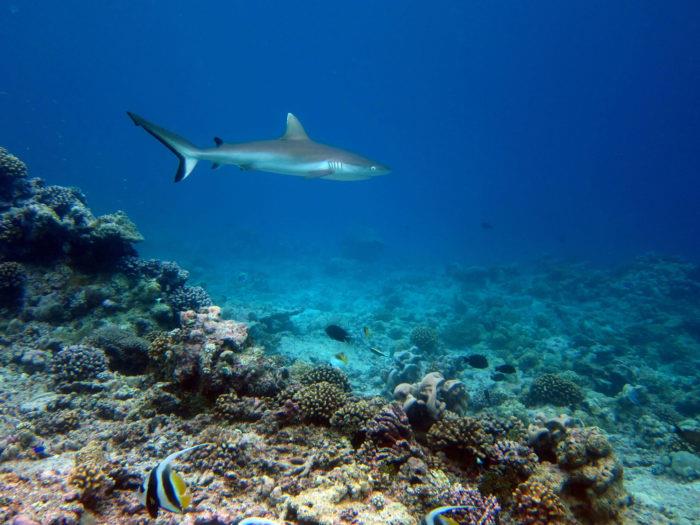
Marine reserves are vital – but under pressure
by ARC Centre of Excellence for Coral Reef Studies 19 Jun 2018 08:56 UTC

A grey reef shark swims over a reef in a large protected area far from humans © Nick Graham
A massive study of nearly 1800 tropical coral reefs around the world has found that marine reserves near heavily populated areas struggle to do their job – but are a vast improvement over having no protection at all.
Professor Josh Cinner from the ARC Centre of Excellence for Coral Reef Studies at James Cook University led a team of 37 scientists examining the effectiveness of different reef conservation strategies.
"Fish stocks were extremely depleted on reefs that were accessible to large human populations. Compared to marine reserves far from these human pressures, reserves near high human pressure had only a quarter of the fish and were a hundred times less likely to have top predators such as sharks," said Professor Cinner.
The scientists also studied how differences in ecological conditions between marine reserves, where fishing is prohibited, and places open to fishing changed as human pressures increased. "This tells you where you can get the biggest impact from implementing conservation," said Professor Cinner.
"A really novel and exciting part of our study found that the greatest difference in fish biomass between marine reserves and places open to fishing was in locations with medium to high human pressure. This means that, for most fisheries species, marine reserves have the biggest bang where human pressures are medium to high," he said.
For example, on reefs subject to high human pressure, marine reserves had five times more fish than openly fished reefs – a benefit that can spillover into the depleted fisheries in surrounding areas.
"However, top predators such as sharks were a different kettle of fish," said co-author Dr Aaron MacNeil from Dalhousie University.
The scientists encountered top predators on less than 30% of their surveys conducted all across the globe, and very rarely in locations where human pressures were high.
"You'd have to do about 200 dives to see a top predator in reserves with the highest human pressure. But where human pressure was low, you'd be likely to see predators more than half the time," said Dr MacNeil.
Dr Michele Barnes from the ARC Centre of Excellence for Coral Reef Studies at JCU said that in many places, social, economic, and cultural realities mean that marine reserves that entirely prohibit fishing are not an option.
"So, we also looked at how effective other forms of reef conservation were, such as restricting the types of fishing gear that people use. Our results were promising – these restrictions certainly had better outcomes than doing nothing, but not as good as marine reserves. They were a sort of compromise," she said.
Professor Cinner said the study makes clear the benefits and limitations of implementing key coral reef conservation strategies in different types of locations. "Our research shows where managers will be able to maximise certain goals, such as sustaining top predators or improving the biomass of key fisheries species, and likewise, where they will be wasting their time," he said.
The paper is available here.